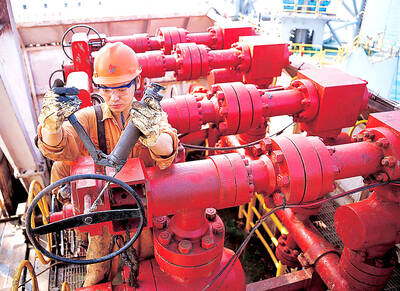The Food and Drug Administration (FDA) yesterday urged international travelers to check the maximum limits of medicines, medical devices, food and cosmetic products that are allowed to be brought into Taiwan, and to remember that they can only be for personal use and are prohibited from being resold.
Under the Regulations Governing the Declaration, Inspection, Duty and Release of Personal Luggage or Goods of Inward Passengers (入境旅客攜帶行李物品報驗稅放辦法), inbound travelers can carry up to 12 bottles, boxes, cans, bars or sticks of one kind of nonprescription medicine, and no more than 36 in total, FDA Medical Products Division deputy head Wu Ming-mei (吳明美) said.
Travelers carrying prescription medication without a doctor’s prescription or documented proof are limited to a two-month supply, while those with a prescription can bring in a reasonable supply, but no more than a six-month supply, she said.
Medicine brought in from other countries can only be for personal use, and people who resell it face a fine of NT$30,000 to NT$2 million (US$949 and US$63,241) under the Pharmaceutical Affairs Act (藥事法), Wu said.
Many Taiwanese like to buy “Alinamin EX Plus” tablets from Japan, but the product is categorized as a medicine, not a dietary supplement, so it can only be purchased for personal use, she said.
While cold medicine containing codeine can be bought over the counter in some countries, it is considered a controlled drug in Taiwan, so it must be brought in with a doctor’s prescription, she said.
A license is required to import medical products, but some are exempt, although there is a limit on the amount brought in and they must be for personal use, FDA Medical Devices and Cosmetics Division deputy head Chien Chia-hung (錢嘉宏) said.
They include adhesive bandages (no more than 60 pieces), liquid bandages (no more than four bottles), medical cotton swabs (no more than 200 pieces), condoms (no more than 60 pieces), tampons (no more than 120 pieces), daily disposable contact lenses (no more than 60 pieces, one brand, two different diopters), prescription eyeglasses (no more than one pair) and medical masks (no more than 250 pieces), Chien said.
Inbound travelers can carry up to 12 bottles, boxes, jars, packs or bags of food tablets or capsules for personal use, and no more than 36 bottles in total, FDA Food Safety Division deputy head Cheng Wei-chih (鄭維智) said, adding that general food products for personal use should be worth no more than US$1,000 in total and not exceed 6kg in total.
Fines totaling NT$8.71 million were issued for 474 cases recorded in 2021 and last year, Cheng said, adding that one person was fined NT$180,000 for selling vitamin products and collagen tablets purchased from other countries on online platforms.
There are also maximum allowable limits for certain types of cosmetic products, such as sunscreen, hair dye or perm solutions, antiperspirant or deodorant, and at-home teeth whitener treatments, Chien said.
Travelers can bring in no more than 12 bottles, boxes, jars, packs or bags of each for personal use, and no more than 36 bottles in total, he said.

The Chinese military has built landing bridge ships designed to expand its amphibious options for a potential assault on Taiwan, but their combat effectiveness is limited due to their high vulnerability, a defense expert said in an analysis published on Monday. Shen Ming-shih (沈明室), a research fellow at the Institute for National Defense and Security Research, said that the deployment of such vessels as part of the Chinese People’s Liberation Army (PLA) Navy’s East Sea Fleet signals a strong focus on Taiwan. However, the ships are highly vulnerable to precision strikes, which means they could be destroyed before they achieve their intended

About 4.2 million tourist arrivals were recorded in the first half of this year, a 10 percent increase from the same period last year, the Tourism Administration said yesterday. The growth continues to be consistent, with the fourth quarter of this year expected to be the peak in Taiwan, the agency said, adding that it plans to promote Taiwan overseas via partnerships and major events. From January to June, 9.14 million international departures were recorded from Taiwan, an 11 percent increase from the same period last year, with 3.3 million headed for Japan, 1.52 million for China and 832,962 to South Korea,

SOVEREIGNTY: The rigs show that Beijing ‘rejects Taiwan’s jurisdiction’ by building in areas where Taipei demands permission to build or alter installations Chinese oil rigs have been sighted just 26 nautical miles (42km), from Taiwan’s exclusive economic zone (EEZ) near Pratas Island (Dongsha Island, 東沙島), posing a threat to Taiwan’s sovereignty if left unchallenged, a brief published by the Jamestown Foundation on Tuesday said. Pratas Island, 444km from Kaohsiung, is northeast of the South China Sea and houses a Taiwanese garrison. The brief, titled “Rigging the Game: PRC Oil Structures Encroach on Taiwan’s Pratas Island” — referring to the People’s Republic of China — analyzed photographs and said that Beijing’s tools to pressure Taiwan now include oil rigs. “Oil rigs now constitute part of Beijing’s

The Taiwan Experience Education Program (TEEP) has funded short-term internships in Taiwan for more than 4,500 young people from more than 40 countries since 2015, with the goal of attracting and retaining international talent, the Ministry of Education said yesterday. Fifty-five colleges launched 514 projects this year, including in fields such as semiconductors, artificial intelligence, medicine and biotechnology, green energy, and sustainability, it said. The program provides research and practical internships in Taiwan for two to six months, and offers cultural exchange and networking opportunities, the ministry said. For example, National Formosa University’s Embedded System and Autopilot Laboratory developed two solar-powered drones in